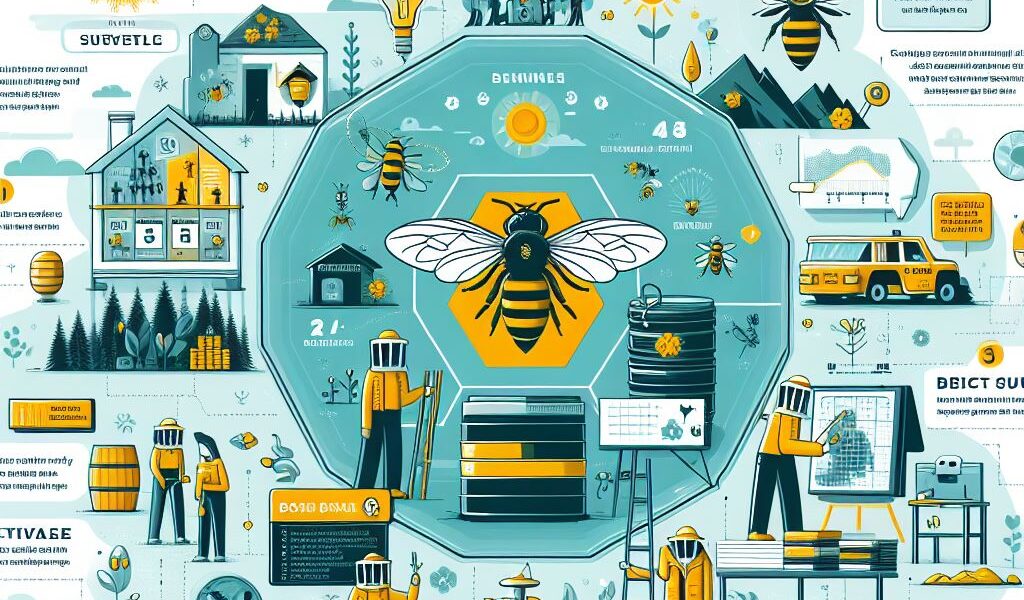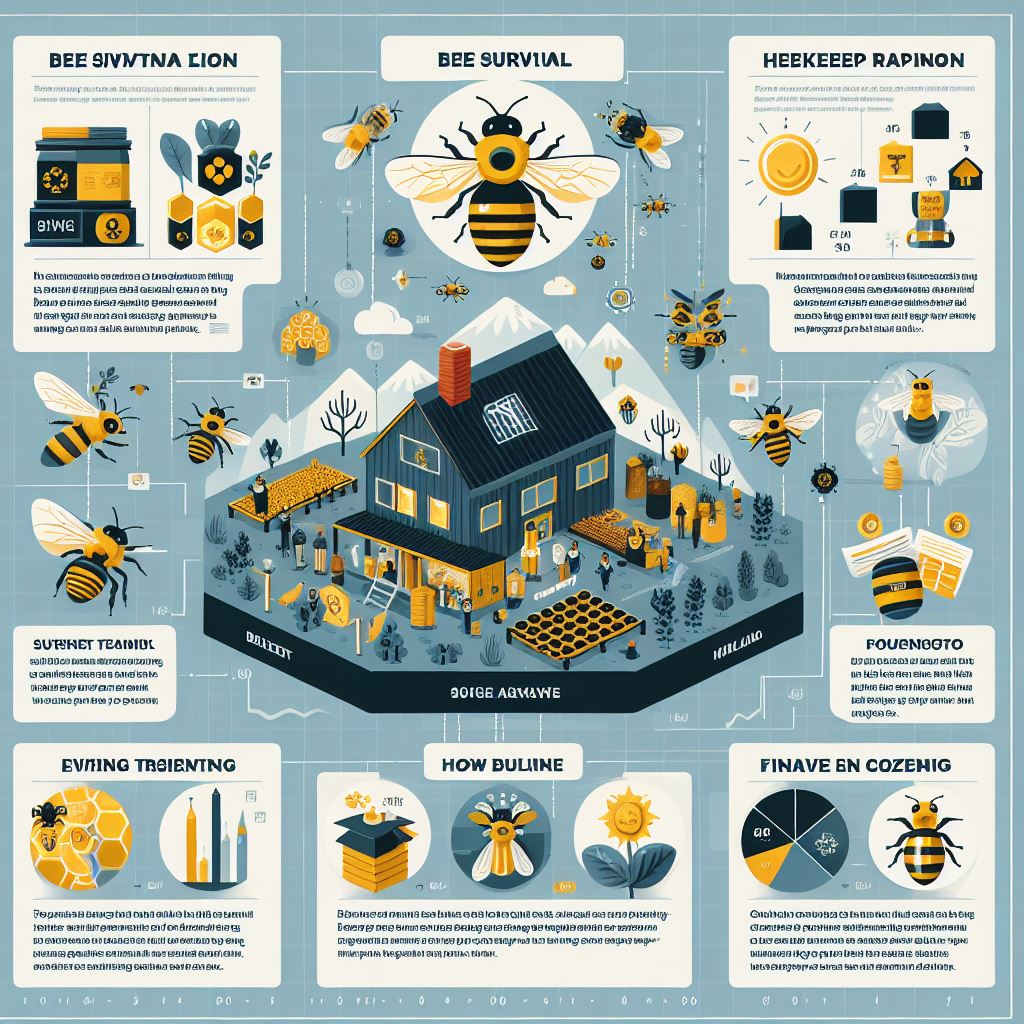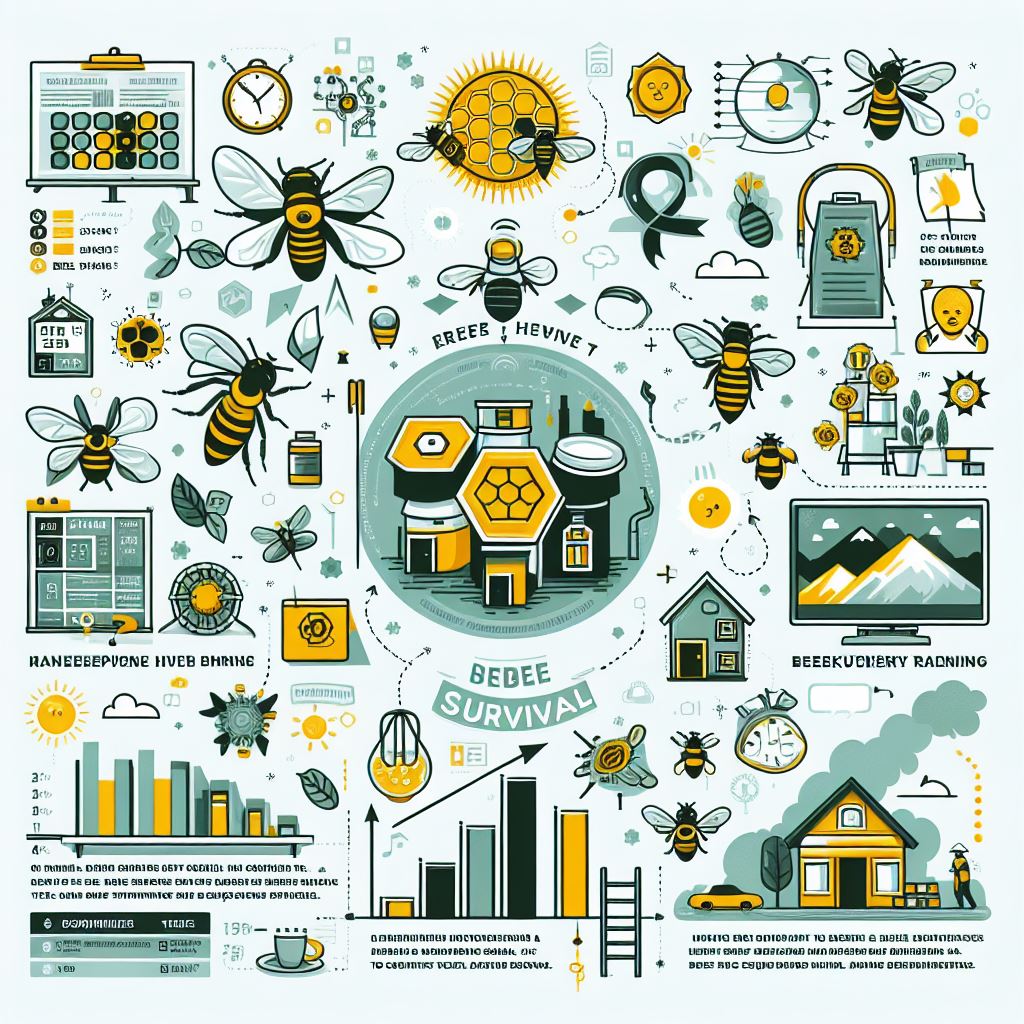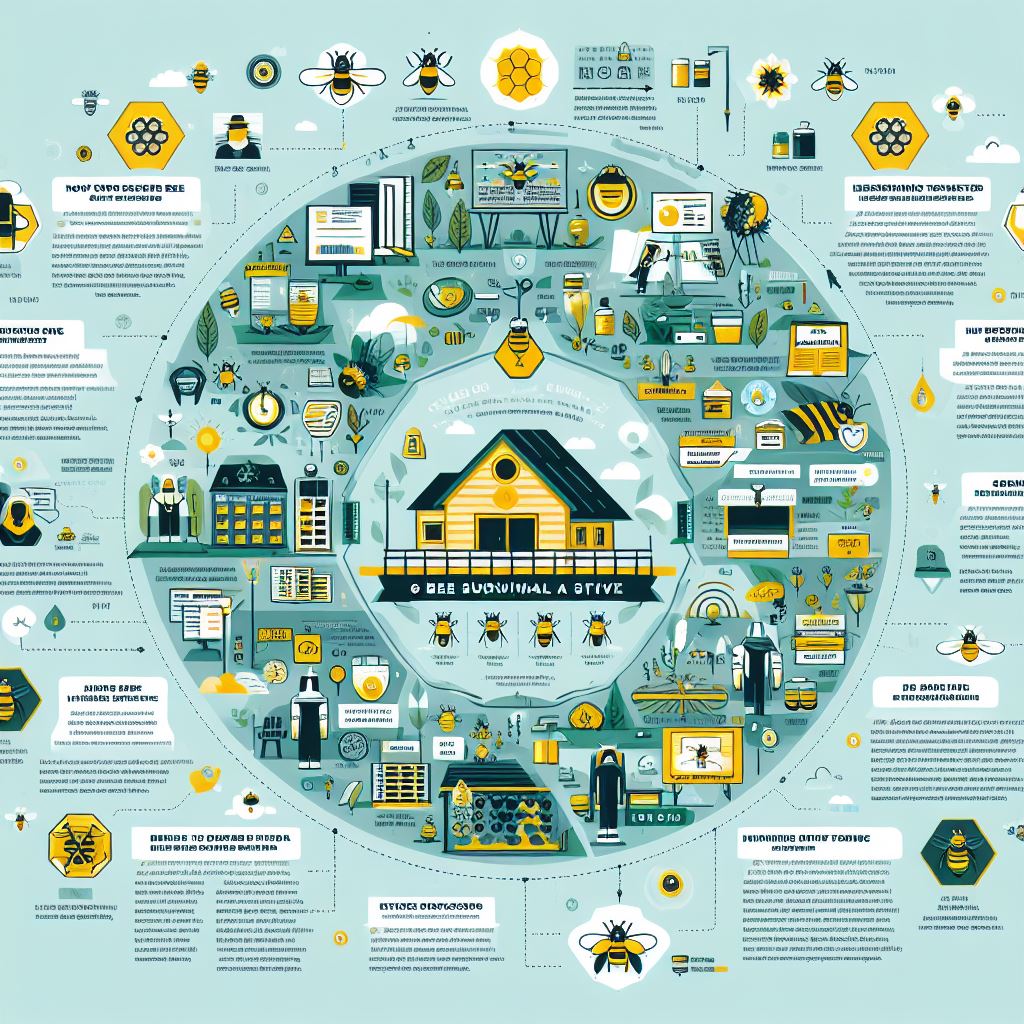Contents
- 1 Empowering Beekeepers with Comprehensive Training Programs
- 2 Prof. Aécio D’Silva, Ph.D. AquaUniversity
- 3 Discover how beekeeping training programs are crucial for the survival of bees and the future of our ecosystems
- 4 The Plight of the Pollinators
- 5 The Role of Beekeeping Training
- 6 Beekeeping Training – Curriculum Essentials
- 7 Hands-On Experience
- 8 Beekeeping Training – Community and Support
- 9 Environmental Stewardship
- 10
- 11 Economic Opportunities
- 12 Urban beekeeping
- 13 Urban Beekeeping: The City Buzz
- 14 Training for Urban Beekeepers
- 15
- 16 Impact on Urban Ecosystems
- 17 Challenges and Benefits of Africanized Bees in Brazil
- 18 The Challenge of Africanized Bees in Brazil
- 19 How it All Happened
- 20 Impact on Native Pollination Networks
- 21 Beekeeping Training Adaptations
- 22 Conservation and Control Efforts
- 23 Economic Implications of Africanized Bee Management in Brazil
- 24 Increased Management Costs:
- 25 Impact on Honey Production:
- 26 Honey Industry and Crop Pollination:
- 27 Economic Benefits of Beekeeping in Brazil Overall
- 28 Diversified Agricultural Pollination:
- 29 Honey Production Growth:
- 30 Income Generation for Smallholders:
- 31 Empowerment through Exports:
- 32 Environmental and Socio-Economic Benefits:
- 33 Low Financial Investment:
Empowering Beekeepers with Comprehensive Training Programs
Prof. Aécio D’Silva, Ph.D.
AquaUniversity
Discover how beekeeping training programs are crucial for the survival of bees and the future of our ecosystems
Bees are not just producers of honey; they are vital pollinators that play a key role in the health of our ecosystems. However, bee populations are declining at an alarming rate, threatening global food security and biodiversity. This blog explores the importance of beekeeping training programs to combat this decline, ensure the survival of these essential creatures, and promote social and economic development. It provides my contribution to discussing the critical role of beekeeping training in preserving bee populations, supporting ecological balance, and creating job opportunities for the communities. Beekeeping is not just about honey; it’s about collaborative knowledge and sustaining life. Let’s dive into it!!!
The Plight of the Pollinators
Bees face numerous challenges, from habitat loss, and parasites to pesticide exposure. These factors contribute to what is known as Colony Collapse Disorder (CCD), leading to the disappearance of bee colonies worldwide.
The Role of Beekeeping Training
Beekeeping training programs offer a beacon of hope. They provide aspiring and experienced beekeepers with the knowledge and skills necessary to manage hives sustainably and combat the factors leading to CCD.
Beekeeping Training – Curriculum Essentials
A comprehensive training curriculum must cover topics such as bee biology, hive management, business administration, disease control, and honey harvesting, ensuring beekeepers are well-equipped to support their hives.
Hands-On Experience
Beyond theoretical knowledge, these programs need to include practical, hands-on experience. This allows participants to learn directly from the hive, gaining insights that only come from close observation and interaction with bees.
Beekeeping Training – Community and Support
Training programs have also fostered a community of beekeepers who can support each other. This network is invaluable for sharing best practices and innovations in beekeeping.
Environmental Stewardship
Through training, beekeepers become advocates for bees, promoting practices that protect and enhance bee habitats and overall environmental health.
Economic Opportunities
Beekeeping can be more than a hobby; it offers economic opportunities. Well-trained beekeepers can turn their passion into a profitable venture, selling honey and other bee products.
Urban beekeeping
Urban beekeeping is a fascinating and important aspect of supporting bee populations. Let’s expand on this collaborative intelligent post with a section dedicated to it:
Urban Beekeeping: The City Buzz
Urban beekeeping has emerged as a vital movement in cities around the world. It involves the practice of keeping bee colonies in urban environments, such as rooftops, balconies, and community gardens. This practice not only helps in pollinating city plants but also provides city dwellers with a unique opportunity to connect with nature.
Urban settings, may face unique challenges such as limited space, higher temperatures, and pollution. However, urban areas can also offer a diverse range of flowering plants, resulting in unique honey flavors. Training programs tailored for urban beekeepers are essential to address these specific challenges and opportunities.
Training for Urban Beekeepers
Urban beekeeper training programs focus on teaching beekeepers how to manage hives safely and effectively in densely populated areas. They cover legal regulations, hive design, and placement, and strategies for minimizing bee-human conflicts.
These programs also emphasize the importance of community engagement and education. By involving local residents and businesses in beekeeping efforts, urban beekeepers can promote awareness and support for bees in the city.
Impact on Urban Ecosystems
Urban beekeeper has a positive impact on the environment. Bees contribute to the health of urban green spaces by pollinating plants, which helps to maintain biodiversity within the city. Moreover, urban beekeeping can serve as a platform for broader environmental initiatives, encouraging sustainable practices and green living among city residents.
Incorporating urban beekeeping into training programs enriches the curriculum and prepares beekeepers for the unique conditions of city life. It’s a step towards creating more sustainable urban communities and ensuring that bees continue to thrive in all environments.
By discussing urban beekeeping, we highlight the adaptability of beekeeping practices and the importance of training programs that cater to the needs of beekeepers, wherever they may be. ?bee. This additional section seamlessly integrates into the original blog structure, emphasizing the versatility and importance of beekeeping training in various environments.
Challenges and Benefits of Africanized Bees in Brazil
Africanized bees, often referred to as “killer bees,” present unique challenges in Brazil and other regions they’ve spread to. Here’s an expanded section on this topic for this blog:
The Challenge of Africanized Bees in Brazil
Africanized bees, a hybrid of African and European honeybees, have become widespread across Brazil, affecting both native bee populations and pollination networks. These bees are known for their aggressive behavior and tendency to swarm and attack perceived threats, posing significant challenges for beekeepers and public safety. Their defensive nature requires beekeepers to adopt special management techniques to ensure safety and high productivity.
How it All Happened
On his return to Brazil in 1956, the famous Brazilian scientist Warwick Estevam Kerr, as part of his baggage, brought 51 queens – 50 from South Africa and one from Tanzania – of the species Apis mellifera scutellata, highly productive but very aggressive (or defensive, as bee scholars prefer to say). These queens gave rise to hives, which were quarantined in a eucalyptus grove on Unesp’s Rio Claro campus, São Paulo, Brazil, to select only the tamest ones.
To prevent the queens from escaping into the wild and scattering, the hives were enclosed by a mesh that allowed only the smaller worker bees to pass through. However, an employee of the team, imagining that the bees were trapped by mistake, removed the meshes from some hives.
As a result, 26 queens escaped, interbred with the European queens, and gave rise to swarms of Africanized bees. These swarms spread first in São Paulo, then throughout Brazil, and today are found across the three Americas. With no natural predators in their new home and being very aggressive, wherever they arrived and settled, they “played terror”. [1]
Impact on Native Pollination Networks
Research indicates that Africanized bees have altered the structure of native pollination networks in Brazil, monopolizing interactions and potentially affecting the pollination service at the community level. While they have not been shown to decrease the robustness of these networks, their generalist foraging behavior may not provide efficient pollination for some native plants, which could have negative implications for biodiversity.
Beekeeping Training Adaptations
Beekeeping training programs in Brazil must address the specific challenges posed by Africanized bees. This includes education on their behavior, safe handling practices, and strategies to mitigate their impact on native ecosystems. Training must also cover legal aspects, as the management of Africanized bees is regulated due to their invasive status and the risks they pose.
Conservation and Control Efforts
Efforts to control the spread of Africanized bees and protect native species are crucial. This involves habitat conservation, research on bee behavior, and public awareness campaigns to reduce the risks associated with these bees. Conservation programs may also include selective breeding to encourage more docile traits in bee populations, aiming to reduce the prevalence of aggressive behaviors characteristic of Africanized bees.
The presence of Africanized bees in Brazil presents a complex challenge that requires a multifaceted approach. Beekeeping training programs play a vital role in equipping beekeepers with the knowledge and skills to manage these bees effectively and minimize their impact on the environment. By addressing the challenges posed by Africanized bees, we can work towards a balance between beekeeping practices and the conservation of native bee species and ecosystems.
This section on Africanized bees adds depth to the blog, highlighting the importance of specialized training and conservation efforts in regions affected by this invasive species. bee
Economic Implications of Africanized Bee Management in Brazil
The economic implications of managing Africanized bees in Brazil are significant and multifaceted. Here’s a breakdown of the key points:
Increased Management Costs:
Beekeepers face higher expenses due to the need for more frequent queen replacement, increased labor costs, and the challenges of finding suitable apiary sites due to public fear and greater liability concerns.
Impact on Honey Production:
While Africanized bees can be productive honey producers, their aggressive nature can make management more difficult, potentially affecting honey yields and the profitability of beekeeping operations.
Honey Industry and Crop Pollination:
The honey industry, with an annual value of $140 million, and general pollination of orchards and field crops, valued at $10 billion annually, could be affected by the spread of Africanized bees. The changes in pollinator populations and behaviors may influence the productivity and economic value of these sectors.
In the broader vision, the management of Africanized bees in Brazil presents economic challenges and also benefits that extend beyond the beekeeping industry to broader environmental and agricultural concerns. Addressing these challenges requires a comprehensive approach that balances the economic benefits of beekeeping with the need for environmental stewardship and public safety.
Economic Benefits of Beekeeping in Brazil Overall
Beekeeping in Brazil offers significant economic benefits, contributing to both the agricultural sector and the livelihoods of beekeepers. Here are some key points:
Diversified Agricultural Pollination:
Bees play a crucial role in the pollination of various crops. In Brazil, the economic value of crop pollination services provided by bees is estimated to be approximately $12–14 billion.
Honey Production Growth:
Brazil has seen an increase in the number of hives by 23% and the volume of honey production by 72%, raising the country to the ninth highest honey producer in the world.
Income Generation for Smallholders:
Beekeeping activities have been shown to increase the income of smallholder families by 15%, which is significant in regions affected by drought and desertification.
Empowerment through Exports:
Small and medium-sized Brazilian rural entrepreneurs, who make up 60.2% of national production, are increasingly empowered to export their products, including honey.
Environmental and Socio-Economic Benefits:
Developing agro-ecological and beekeeping practices has considerable environmental and socio-economic benefits, improving the standard of living for many families involved in beekeeping.
Low Financial Investment:
The production chain demands low financial investment since beekeeping is often complementary to other crops, making it an accessible venture for many small-scale farmers. Beekeeping in Brazil not only supports biodiversity and ecosystem services but also provides substantial economic benefits, contributing to the growth of the agricultural sector and improving the livelihoods of beekeepers across the country.
To conclude, beekeeping training programs are more than just educational courses; they are an investment in the future of our planet. By equipping individuals with the skills and knowledge to care for bees, we are taking a significant step towards ensuring the survival of these crucial pollinators, the health of our ecosystems, and economic prosperity.
References:
- “The Beekeeper’s Handbook” by Diana Sammataro
- “Beekeeping for Dummies” by Howland Blackiston
- “The Hive and the Honey Bee” edited by Joe M. Graham
- “Bees Information Notes” provided by Rick Carpenter, ACI, Florence, Arizona, US.
- https://journals.plos.org/plosone/article?id=10.1371%2Fjournal.pone.0200286
- https://cisr.ucr.edu/invasive-species/africanized-honey-bee
- https://beespotter.org/topics/economics/
- https://link.springer.com/article/10.1007/s10530-012-0235-8
- https://animalsresearch.com/africanized-bee-killer-bee/
- [1] Evanildo da Silveira De Vera Cruz (2023). Como brasileiro criou ‘abelhas assassinas’ por acidente e revolucionou a apicultura. BBC News Brasil – https://www.bbc.com/portuguese/brasil-64329040






